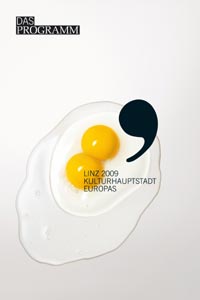New Years Eve 2008 – 2009 showed the Grand Opening of LINZ 2009, European Capital of Culture, with a fireworks extravaganza: the world premiere of the Rocket Symphony, an acoustic and visual accompaniment of a chorus of several hundred singers and 16 soloists arrayed along the banks of the Danube, between the Ars Electronica Centre, the Nibelungen Bridge, the Lentos Museum of Modern Art and the Bruckner Haus. Martin Heller, the brilliant Intendant of Linz 09, was clearly delighted: ‘The start was breathtaking. Everybody knows now that Linz is the European Capital of Culture!’.
No Austrian City has changed as dramatically as Linz in recent years. Once a nice, quiet commercial town on the banks of the Danube, then the place that Adolf Hitler adopted as his hometown, and later a capital of heavy industry with all the side-effects and risks that entails, Linz today is a modern urban centre with a flourishing economy and exceptional quality of life. A city where interesting things are happening and the future is taking shape right now. The mission of Linz 2009, European Capital of Culture is to be a part of this process: an initiative implementing sustainable urban development and a driving force for progress in promising directions.
Linz ‘09
Linz is ready for a year in the limelight as European Capital of Culture. The opening event signalled that the working class town wanted to offer projects that appeal to visitors and the local people alike. On December 31, official guests were not treated to a formal dinner but were rather invited into the homes of locals including families, university people and gay couples.
Besides the annual Ars Electronica festival of media and electronic art and an exhibition called ‘Best of Austria’, featuring works from the country’s most famous museums, there are only a few traditional cultural events, but many unusual projects. A group of artist organises ‘surveillance-free-tours’, for which participants wear camouflage gear and sneak and crawl their way to tourist sites, evading the gaze of security cameras. At one of the festivals, Linz will host a number of international puppet theatre players with productions geared towards adults.
Hitler’s cultural capital
Linz has the desire to deal with the city’s past: Composer Anton Bruckner was the organist at Linz Cathedral; philosopher Ludwig Wittgenstein went to school in Linz. But, there is also a dark side to the city’s past. Adolf Hitler wanted the city where he had spend nine years of his childhood to become one of the five ‘Fόhrer Cities’ of the Third Reich, together with Berlin, Munich, Hamburg and Nuremberg.
Linz was to take on the role of European cultural centre with a German nationalist stamp. Fortunately, few of the plans of Hitler were realised. The megalomania of the project is the subject of an exhibition ‘The Cultural Capital of the Fόhrer’ at the Linz Palace Museum. The city is using the opportunity to face up to its past!






